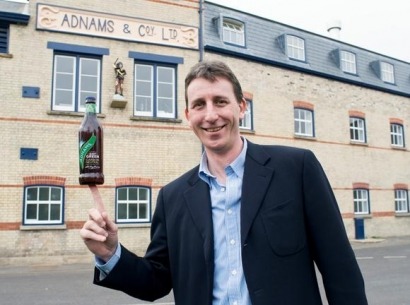
In partnership with British Gas and the National Grid, the £2.75 million facility started injecting renewable gas into the gas grid back in October, and will generate up to 4.8 million kilowatt-hours per year; enough, says the developer Adnams Bio Energy, to heat 235 family homes for a year or run an average family car for 4 million miles.
As the AD process kicks in, it is expected the facility will produce enough renewable gas to power Adnams’ brewery and run its fleet of lorries, while still leaving up to 60 percent of the output for injection into the National Grid.
“Someone else’s waste, is someone else’s energy,” says Adnams’ Chief Executive, Andy Wood, and on that premise, the AD facility is using not only brewery waste, but also food waste from local retail outlets, schools, hospitals and local authorities to generate biomethane. “The plant will make a contribution to decarbonising the gas grid by delivering renewable heat to households. It will also prevent the release of highly-polluting methane to the atmosphere, through diverting the waste from landfill,” says Adnams.
A viable alternative to natural gas
Biomethane is is very similar to natural gas and, once upgraded to grid specification, can be injected into the gas network for end use by customers. Indeed, according to a study by the UK’s gas network operator, National Grid, it could account for at least 15 percent of domestic gas consumption by 2020.
The Adnams Bio Energy plant consists of three digesters – sealed vessels in which naturally-occurring bacteria act without oxygen to break down up to 12,500 tonnes of organic waste each year. The result is the production of biomethane as well as a liquid organic fertiliser.
In addition, following an agreement with Centrica – the parent company of British Gas, Adnams Bio Energy has deployed British solar thermal panels and will shortly install cutting-edge photovoltaic cells, which will in effect create a mini energy park. The deal will ensure that all of the site, including the Adnams Distribution Centre, will be using renewable energy generated on-site with some surplus energy available for export.
Funds from RBS in Cambridge and grants from the European Regional Development Fund (EDRF), East of England Development Agency (EEDA) and the Department of Energy and Climate Change have provided a vital financial contribution to the construction of this renewable energy facility, which Steve Sharratt, Chief Executive of Bio Group says is “the first stage of a national roll out of AD plants”. Bio Group has a vast amount of experience in the design and construction of processing plants across the UK using innovative, low carbon building techniques to produce energy through a completely organic and natural process. “Nothing is wasted,” says Sharratt.
Waitrose was the first business to sign up to supply waste to the facility and has committed to sending food waste from seven of its nearby branches of Waitrose along with a local John Lewis. Meanwhile, other suppliers of organic material are queuing up to use the facility, attracted by the savings they can make on avoiding landfill tax, and Andy Wood has revealed that the AD facility is proving so successful that Adnams Bio Energy is already planning expanding the plant.
Greener beer
Adnams declared they “believe in doing the right thing – not just because it makes us feel good, but because it makes business sense”. The company has certainly taken its motto to heart, rolling out not only the new AD facility, but also constructing a new eco-distribution centre and energy efficient brewhouse, and developing what it describes as “the UK’s first carbon neutral beer”.
Committed to reducing the brewery’s carbon footprint still further in an attempt to become fully carbon neutral, the company has worked with the University of East Anglia’s Community Carbon Reduction Programme (Cred) team for a number of years. The outcome is an award-winning and popular selling beer called carbon neutral, East Green. By using high yielding barley, grown and malted in nearly East Anglia and English Boadicea hops that are naturally aphid-resistant, reducing the need for pesticides; and developing a lightweight beer bottle, Adnams is able to ensure that only a tiny amount of remaining carbon dioxide needs offsetting (0.004 pence per bottle to be precise).
Again, Woods reveals that Adnams is setting the trend in the UK brewing industry, with other beer producers looking to develop lightweight bottles too.
Editor's note: An exclusive interview with Andy Wood of Adnams and Steve Sharrat of Bio Energy is available here.
For additional information:

